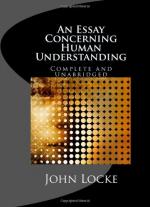
|
| Name: _________________________ | Period: ___________________ |
This quiz consists of 5 multiple choice and 5 short answer questions through Book II, Chapters 1-15.
Multiple Choice Questions
1. What does Locke say about sensations that an infant feels in utero?
(a) They are the basis of innate knowledge.
(b) They form the instincts.
(c) They must be un-learned.
(d) They do not constitute innate knowledge.
2. To what does Locke attribute the ability to create technology and to organize our environment?
(a) Reason.
(b) Perception.
(c) Science.
(d) Sensitivity.
3. What is the limitation of understanding, according to Locke?
(a) It cannot reckon things that cannot be perceived.
(b) We cannot use it in religion or spirituality.
(c) We do not always know how to distinguish it from faith.
(d) We cannot turn it against itself.
4. Which is NOT a category of complex ideas, according to Locke?
(a) Relations.
(b) Substances.
(c) Styles.
(d) Modes.
5. What does Locke claim separates mankind from all other creatures on earth?
(a) Compassion.
(b) Envy.
(c) Language.
(d) Understanding.
Short Answer Questions
1. What does Locke say about the difference between reflection and sensation?
2. How does Locke define complex ideas?
3. How does Locke describe the work principles do?
4. What are modes, according to Locke?
5. What consequence does the fact that knowledge is limited have on our knowledge, according to Locke?
|
This section contains 271 words (approx. 1 page at 300 words per page) |

|




